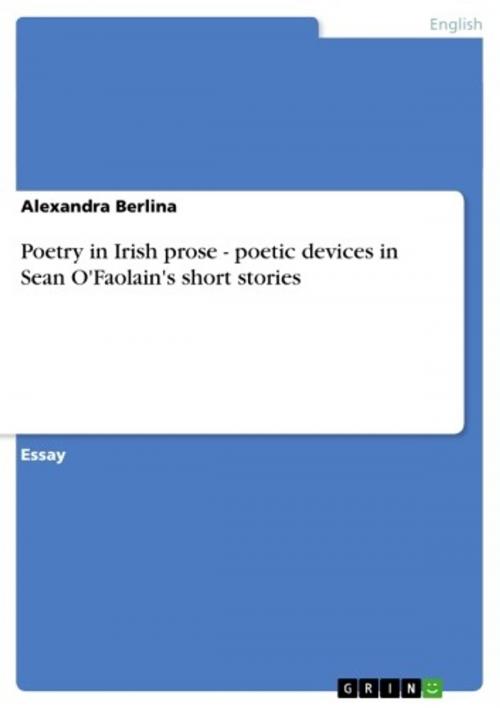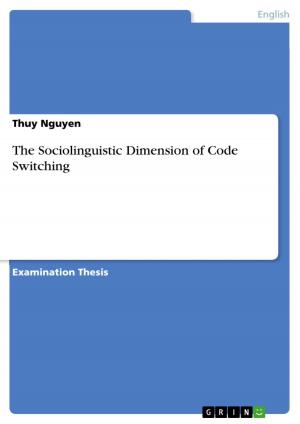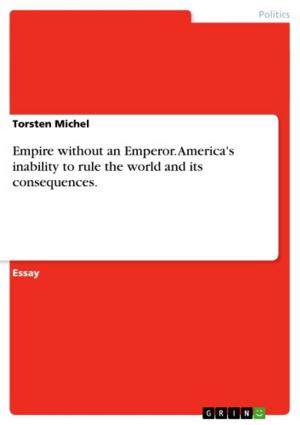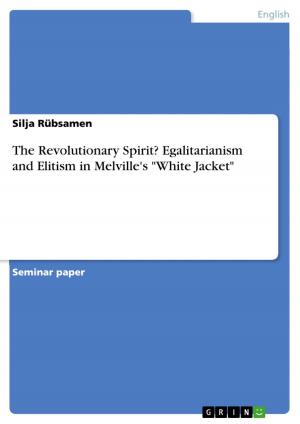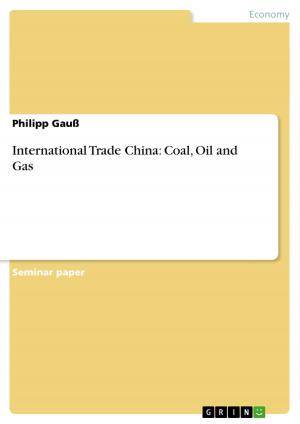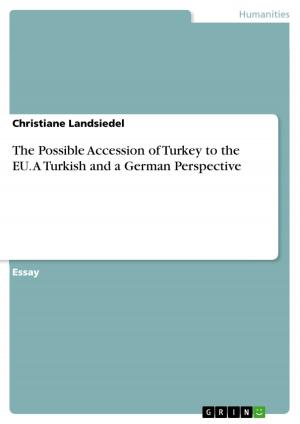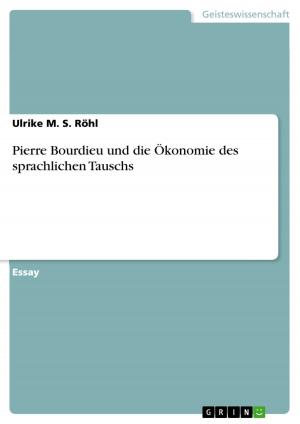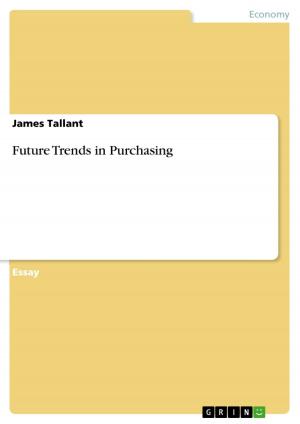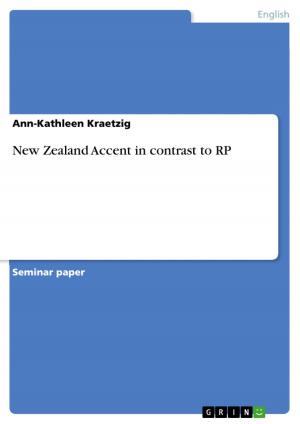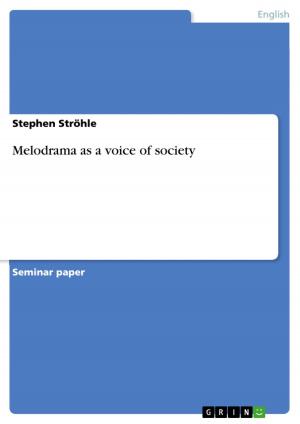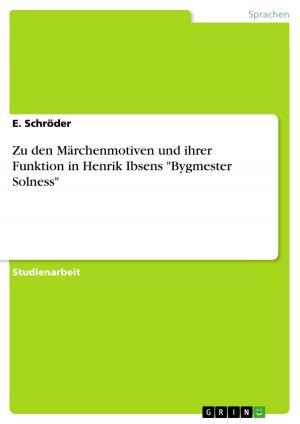Poetry in Irish prose - poetic devices in Sean O'Faolain's short stories
poetic devices in Sean O'Faolain's short stories
Fiction & Literature, Literary Theory & Criticism, British| Author: | Alexandra Berlina | ISBN: | 9783638282338 |
| Publisher: | GRIN Publishing | Publication: | June 11, 2004 |
| Imprint: | GRIN Publishing | Language: | English |
| Author: | Alexandra Berlina |
| ISBN: | 9783638282338 |
| Publisher: | GRIN Publishing |
| Publication: | June 11, 2004 |
| Imprint: | GRIN Publishing |
| Language: | English |
Essay from the year 2004 in the subject English Language and Literature Studies - Literature, grade: 1, University of Dusseldorf 'Heinrich Heine' (Anglistics), course: Seminar 'Irish Literature and Sean O' Faolain', language: English, abstract: It was simple to define poetry hundred years ago: a poem had to contain a measure, rhythm and rhymes. Nowadays, none of them is indispensable any more. So, what is poetry? In my opinion, poetry is primarily qualified by a concentrated language. I feel certain that there is a relationship between the German words 'Dichte' (concentration, denseness) and 'Dichter' (poet, writer). In a poem, every single word should be essential, no word random, nothing to delete or to add. There is only one literary genre where this tightness of language is almost as important - the short story. Sean O'Faolain wrote poems in his youth, and then he switched to short stories. It seems to me that he did not consider himself talented enough as a poet to publish his verses (maybe partly because of the experience he describes in his autobiography 'Vive moi!' - as a student, he was laughed at for his naïve poem about Mother Ireland's teeming navel), but still felt a desire to write poetry. Interestingly, the twenty-four years old hero of 'How to write a short story' with whom the author seems to identify, had rested from writing poetry and was trying to write short stories. The short story is a genre that has a long tradition in Ireland and many Irish masters, but that is surely not the only reason why O'Faolain wrote mainly short stories. He must have felt the close relationship between them and verses. He wrote prose, but smuggled poetry into it. O'Faolain either placed his own poems into his stories (a few times, for example, in 'Hymenial'), or quoted other poets there (far more frequently), or he made whole passages of his prose sound remarkably poetic - and this he did in almost every story. To analyze this phenomenon, I have chosen O'Faolain's later stories (from 1970 on, the collections 'The Talking Trees and Other Stories', 'Foreign Affairs and Other Stories' and the last stories published only after the author's death). By the time he wrote them, he was not so susceptible for outer influences as in his youth. These works are more mature and original; they contain less romantic (and other) clichés than his early experiments. Therefore, these compositions are more interesting to study and to decompose into single metaphors, similes, alliterations etc - especially if there are many of them at once, as it often occurs in his stories. I did not use any secondary literature, because I wanted to study O'Faolain's way of writing by myself.
Essay from the year 2004 in the subject English Language and Literature Studies - Literature, grade: 1, University of Dusseldorf 'Heinrich Heine' (Anglistics), course: Seminar 'Irish Literature and Sean O' Faolain', language: English, abstract: It was simple to define poetry hundred years ago: a poem had to contain a measure, rhythm and rhymes. Nowadays, none of them is indispensable any more. So, what is poetry? In my opinion, poetry is primarily qualified by a concentrated language. I feel certain that there is a relationship between the German words 'Dichte' (concentration, denseness) and 'Dichter' (poet, writer). In a poem, every single word should be essential, no word random, nothing to delete or to add. There is only one literary genre where this tightness of language is almost as important - the short story. Sean O'Faolain wrote poems in his youth, and then he switched to short stories. It seems to me that he did not consider himself talented enough as a poet to publish his verses (maybe partly because of the experience he describes in his autobiography 'Vive moi!' - as a student, he was laughed at for his naïve poem about Mother Ireland's teeming navel), but still felt a desire to write poetry. Interestingly, the twenty-four years old hero of 'How to write a short story' with whom the author seems to identify, had rested from writing poetry and was trying to write short stories. The short story is a genre that has a long tradition in Ireland and many Irish masters, but that is surely not the only reason why O'Faolain wrote mainly short stories. He must have felt the close relationship between them and verses. He wrote prose, but smuggled poetry into it. O'Faolain either placed his own poems into his stories (a few times, for example, in 'Hymenial'), or quoted other poets there (far more frequently), or he made whole passages of his prose sound remarkably poetic - and this he did in almost every story. To analyze this phenomenon, I have chosen O'Faolain's later stories (from 1970 on, the collections 'The Talking Trees and Other Stories', 'Foreign Affairs and Other Stories' and the last stories published only after the author's death). By the time he wrote them, he was not so susceptible for outer influences as in his youth. These works are more mature and original; they contain less romantic (and other) clichés than his early experiments. Therefore, these compositions are more interesting to study and to decompose into single metaphors, similes, alliterations etc - especially if there are many of them at once, as it often occurs in his stories. I did not use any secondary literature, because I wanted to study O'Faolain's way of writing by myself.
